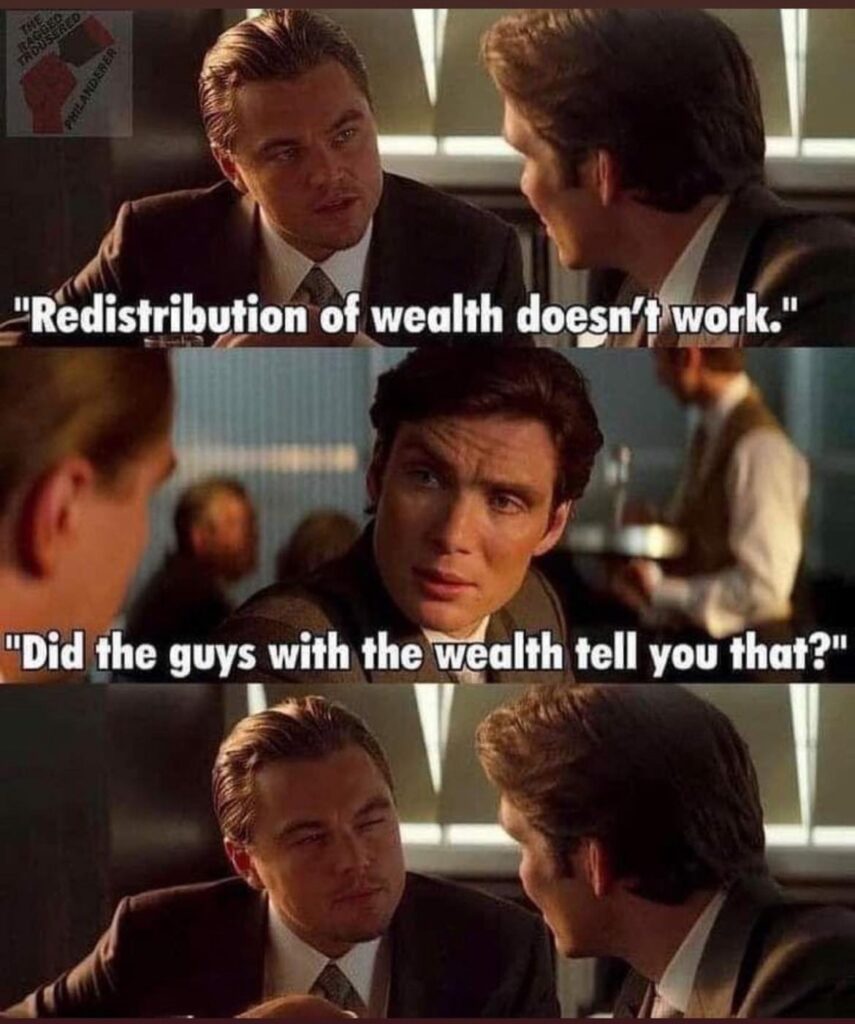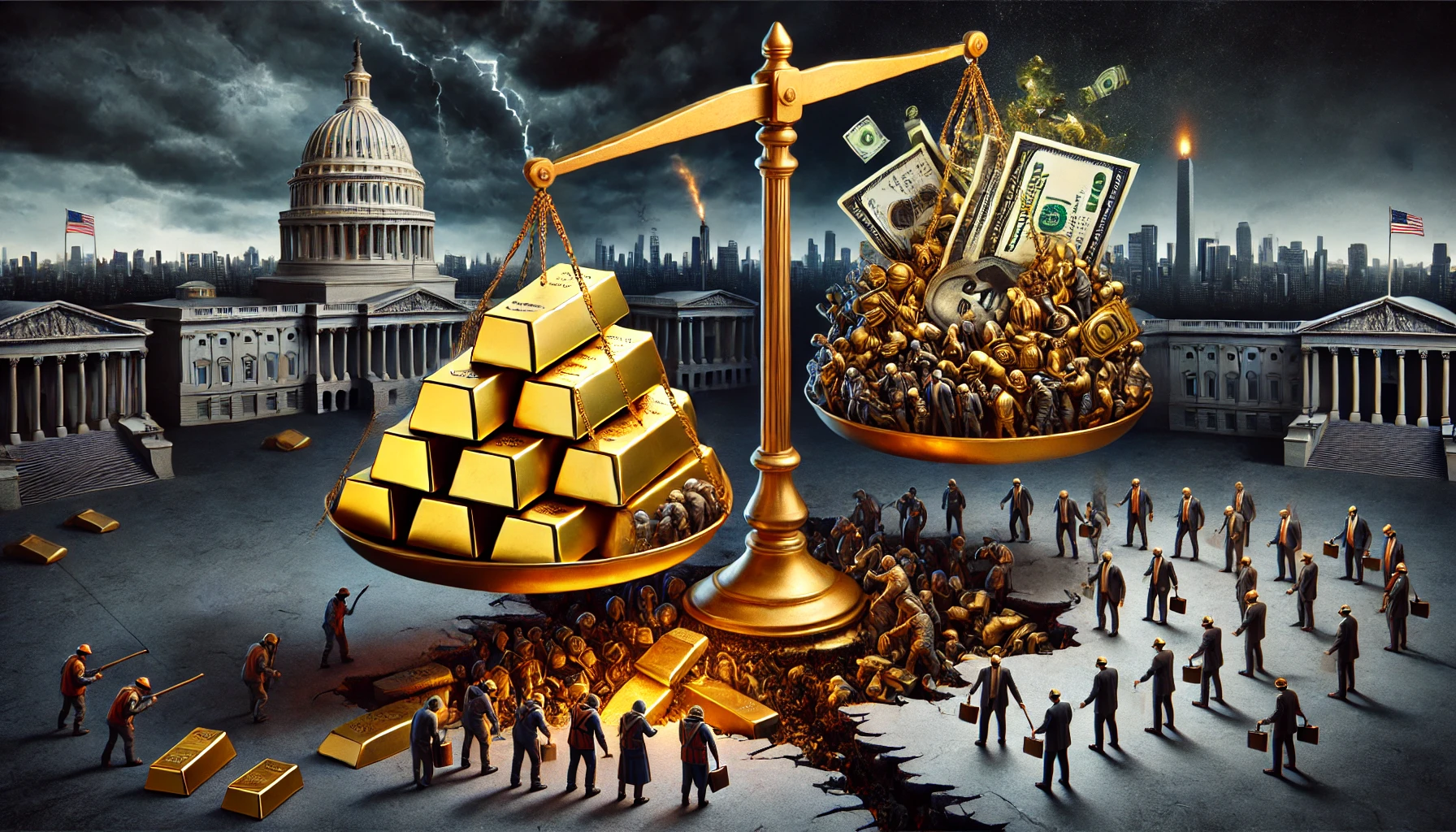Imagine spending $50,200—a median annual income for an individual in the United States in 2024—every single day for a year and ending the year richer than when you started. This isn’t a hypothetical exercise; it’s the reality for someone with $1.75 billion in wealth. Even after daily indulgence in this absurd level of spending, the compounding growth of their investments ensures they have more at year’s end.
This staggering inequality isn’t just about numbers; it’s about a system that allows wealth to grow unchecked, democracy to falter, and the social contract to erode. As billionaires amass unimaginable fortunes, their influence extends far beyond their bank accounts, shaping policies, economies, and even the fate of nations. This article explores the absurdity of extreme wealth, debunks the persistent myth of trickle-down economics, and examines how billionaire greed threatens democracy itself.
A Day in the Life of a Billionaire
Consider the absurdity of wealth inequality in real terms: $1.75 billion is more money than most people can comprehend, let alone earn in multiple lifetimes. To put it in perspective, someone earning $50,200 a year—representative of the U.S. median income—would need nearly 35,000 years to reach that figure. Yet billionaires wield this fortune as a baseline, spending extravagantly, lobbying aggressively, and growing their wealth exponentially.
To be fair, I am not an economist and my math is simplistic. I just assumed that 8% of the net worth is paid in taxes every year and the net remaining wealth grows at 10%. Someone with only $1.25 billion in wealth would actually lose a little money each year under this formula—but it would still take more than 140 years for them to reach zero.
There are a thousand other factors that can impact those figures either way, but the reality is that most billionaires aren’t paying 8% of their net worth in taxes, and many—if not most—are able to achieve better than 10% returns on their investments. Also, who in the hell needs to spend $50,000 every day of every year? So, if anything, my math may be far too conservative.
The Federal Reserve’s data paints a grim picture. The top 1% of Americans control over 30% of the nation’s wealth, while the bottom 50% struggle with just 2%. This chasm widens as the ultra-wealthy find new ways to hoard money and minimize taxes, exacerbating economic and social divides.
The Persistent Myth of Trickle-Down Economics
The foundation of modern wealth inequality lies in the myth of trickle-down economics—the idea that cutting taxes for the wealthy spurs investment, job creation, and economic growth for everyone. Originating during the Reagan era, this theory has shaped decades of policy. Yet its promises remain unfulfilled.
According to Robert Reich, trickle-down economics has systematically failed. Rather than reinvest in their businesses or employees, the wealthy use tax cuts to pad their portfolios, fund stock buybacks, and stash money in offshore accounts. Meanwhile, workers face stagnant wages and rising costs of living. Data shows that direct investment in lower- and middle-income households produces a far greater economic impact than tax breaks for billionaires. When wealth is hoarded, it is effectively removed from circulation, starving the economy of the spending that drives growth.
This is just common sense.
If you give more money to people who are poor or middle class, they don’t have the luxury of hoarding it. They need to pay rent and buy groceries. They have medical bills to pay, and automobile repairs to deal with. They need to replace their broken refrigerators. Bottom line—when you funnel money to lower and middle class families, it is virtually guaranteed to flow back into the economy…and eventually line the pockets of the wealthy anyway. But, if you give money to people who already have more money than it is even possible to spend, they simply add it to the hoard and jealously guard their wealth like Smaug in The Hobbit.
The numbers tell the story: Despite decades of tax cuts favoring the rich, income inequality in the U.S. has surged to historic levels. The supposed benefits of trickle-down policies remain trapped at the top, never reaching the vast majority of Americans.
How Billionaires Rig the System
Few events have so profoundly shifted the balance of power in favor of the wealthy as the Supreme Court’s 2010 decision in Citizens United v. Federal Election Commission. In a narrow 5-4 ruling, the Court determined that corporations and unions could spend unlimited amounts on political campaigns, effectively equating money with speech. This decision unleashed a flood of dark money into American politics, allowing billionaires to openly buy influence and tilt the democratic process in their favor.
The ruling didn’t happen in a vacuum—it was part of a broader pattern of billionaires leveraging their wealth to erode democratic safeguards. And now, we know that at least one Supreme Court justice who cast a vote in favor of this decision, Clarence Thomas, has been deeply entangled in ethical scandals involving billionaire Harlan Crow. Reports from ProPublica and other outlets have revealed that Thomas accepted undisclosed luxury travel, expensive gifts, and even real estate transactions from Crow, a conservative mega-donor. These revelations cast doubt on the impartiality of the Court and suggest that billionaires can effectively buy Supreme Court decisions.
Harlan Crow’s largesse is not merely about personal generosity—it’s an investment in a system that benefits him and his peers. By influencing a justice on the nation’s highest court, Crow has helped secure rulings that perpetuate the dominance of the ultra-wealthy. The Citizens United decision is a prime example, making it easier for billionaires to drown out the voices of ordinary Americans by flooding campaigns with money, shaping policy to their liking, and entrenching their power.
This ruling, coupled with unchecked wealth concentration, has transformed the United States into an oligarchy in all but name. Politicians no longer answer to voters but to donors with deep pockets. Billionaires now dictate policy agendas, block reforms that would benefit the majority, and stack the courts to ensure their grip on power remains unshaken.
The Citizens United decision has also exacerbated political polarization and corruption. Unlimited spending has emboldened billionaires to pour money into divisive, fringe candidates and causes, further destabilizing American democracy. Meanwhile, the public trust in institutions, including the Supreme Court, continues to erode as revelations like Thomas’s relationship with Crow come to light.
This is more than a policy debate; it’s a fundamental threat to democracy. When a handful of billionaires can buy political influence, judicial decisions, and even legislators themselves, the principles of equality and representation are obliterated. The scales of justice are no longer blind—they are weighed down by the interests of the ultra-wealthy.
Addressing this crisis requires urgent action. Public calls for stronger judicial ethics rules, campaign finance reform, and transparency measures must grow louder. It’s time to reverse the damage done by Citizens United, limit the corrupting influence of money in politics, and restore trust in democratic institutions.
If billionaires like Harlan Crow can buy Supreme Court decisions today, what hope is there for a fair and representative system tomorrow? The fight to reclaim democracy begins with acknowledging the rot at its core—and demanding systemic change to excise it.

The Moral and Societal Cost of Billionaire Greed
The societal cost of extreme wealth concentration is staggering. As billionaires hoard resources, millions struggle to afford healthcare, education, and housing. This erosion of the social contract fuels distrust, resentment, and unrest.
Consider countries with more equitable tax systems, such as those in Scandinavia. These nations invest heavily in public goods, resulting in lower poverty rates, better health outcomes, and greater social mobility. By contrast, the U.S. allows billionaires to hoard wealth while basic needs go unmet for millions.
This isn’t just an economic failure—it’s a moral one. What does it say about a society where a select few can live in unimaginable luxury while others ration insulin or face eviction? At what point does wealth accumulation become not just excessive but actively harmful?
The Path Forward: Restoring Balance and Democracy
Addressing wealth inequality requires bold action. Progressive wealth taxes, closing tax loopholes, and enforcing financial transparency are crucial first steps. By ensuring billionaires contribute their fair share, we can fund public goods like healthcare, education, and infrastructure—investments that benefit everyone, not just the elite.
But policy alone isn’t enough. We must also dismantle the myths that sustain the billionaire class, starting with trickle-down economics. Public education on economic systems and civic engagement can counter billionaire narratives and empower citizens to demand change.
Reclaiming democracy from the grip of extreme wealth is not just possible—it’s essential. History shows that collective action and informed advocacy can challenge entrenched power.
Reclaiming the Future
Change is possible. I’ll let you in on a little secret: Billionaires need consumers. Consumers don’t need billionaires. The wealth they covet has to come from somewhere. If nobody has money to buy goods and services, the economy will collapse.
Extreme wealth is not just absurd—it’s dangerous. When billionaires can spend the median annual income daily and still grow richer, it reveals a system designed to serve the few at the expense of the many. When that wealth is used to rig democracy, the stakes become even higher.
By addressing inequality, holding billionaires accountable, and demanding policies that prioritize the common good, we can restore balance to our economy and society. The future of democracy depends on it. The only question is whether we’re willing to fight for it.


